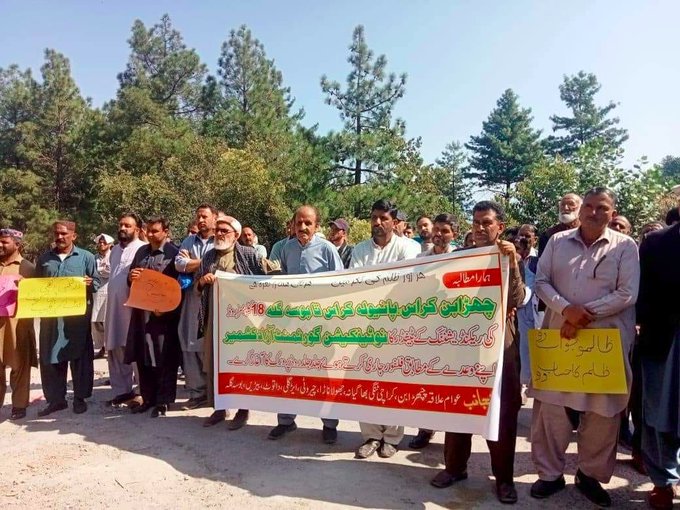The Jammu and Kashmir People’s Action Committee has criticized the occupied-Army state of Pak-occupied- Jammu and Kashmir (POJK) and Islamabad for their failure to address critical issues concerning electricity tariffs and wheat shortages. Despite negotiations earlier this year, the promises made to address these issues remain unfulfilled, leaving residents frustrated and further fueling discontent in Pakistan-occupied Jammu and Kashmir (PoJK).
In May 2024, after a series of long marches and protests in Rawalakot, representatives of the occupied-government and the POJK Chief Secretary promised key reforms to alleviate the hardships faced by the region’s residents. However, eight months on, the committee reports that only two demands have been partially implemented, with no tangible relief provided on other crucial matters.
The agreed-upon memorandum from the Water & Energy Resources Department promised lower electricity tariffs and the installment-based payment of arrears. It stipulated that the tariff for the first 300 units would be Rs. 10 per unit, and Rs. 15 per unit for higher consumption. However, the committee has revealed that these tariffs are not being honored, and old rates are still being imposed. This breach of agreement reflects the systemic neglect and exploitation that PoJK residents have come to expect under Pakistan’s military-administration.
Exploitation of PoJK
The military and Islamabad have historically prioritized extraction of resources over addressing the region’s basic needs. The residents of PoJK, already facing unemployment and infrastructure decay, are now forced to pay exorbitant electricity bills while essential food supplies like wheat remain scarce.
The committee has highlighted the alarming reduction in wheat allocation. Although officials announced a fixed price of Rs. 1,000 for 20 kg of wheat and Rs. 2,000 for 40 kg, inflated prices are being charged, and allocations have been slashed. The scarcity of essential items has made survival increasingly difficult, with residents accusing the food department of corruption and mismanagement.
Protests Intensify
Amid growing resentment, the Awami Action Committee has demanded immediate resolution of these issues. They are calling for:
- An end to arbitrary electricity tariffs and a halt to harassment of citizens through inflated bills.
- Restoration of wheat allocations and measures to curb corruption in the food distribution system, including implementing a biometric tracking system for transparency.
- Action against corrupt officials responsible for overcharging and smuggling essential supplies.
- Reduction in privileges for government elites and the introduction of austerity measures, such as limiting officials to one vehicle and reducing the size of the cabinet to seven ministers.
The committee has warned that failure to meet these demands will result in intensified protests on Oct 22, as residents of PoJK are no longer willing to tolerate the exploitation by Islamabad and the Pakistan Army.
Pak Army’s Neglect Fuels Discontent
The crisis in PoJK exemplifies how the Pakistan Army’s priorities lie in resource extraction and suppressing dissent, rather than addressing the needs of the people. The military, which has significant influence over both the region’s administration and its resources, continues to ignore calls for reform. Instead, the Army’s focus has been on maintaining control over PoJK through force.
The failure to address electricity and food crises is part of a broader pattern of neglect that has persisted for decades, exposing the hypocrisy of Islamabad’s claims to care for Kashmiris. The exploitation of PoJK’s people mirrors the military’s colonial mindset, where local grievances are silenced, and resources are diverted for the benefit of Pakistan’s ruling Punjabi elite.

